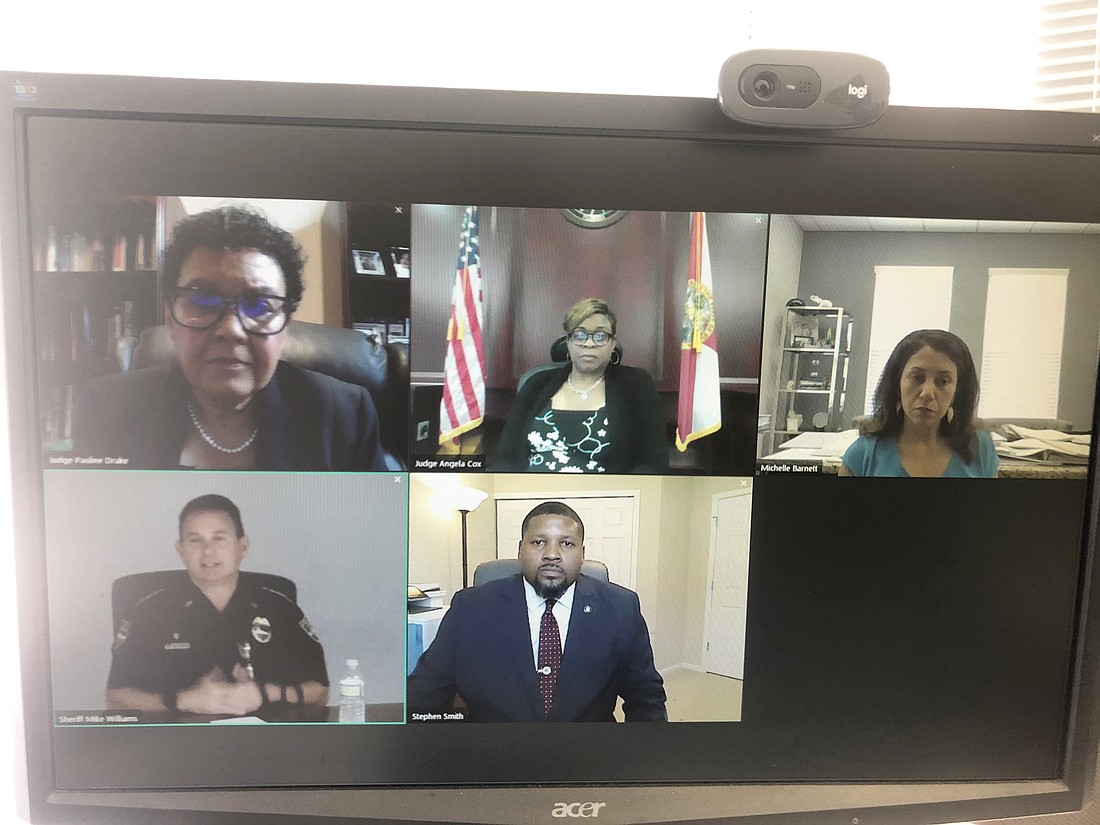
The Jacksonville Bar Association hosted its first virtual public “Community Conversation” on July 7 to discuss race relations and issues facing the local justice system.
“This is just the beginning of the conversation,” said Joni Poitier, attorney at Moseley Prichard Parrish Knight & Jones and co-chair of the JBA Diversity and Inclusion Committee.
The panel included Circuit Judge Angela Cox and retired Duval County Judge Pauline Drake.
They were joined by attorney Ray Driver, founding partner of Driver, McAfee, Hawthorne & Diebenow; Jacksonville Sheriff Mike Williams; and JBA President Michelle Bedoya Barnett, partner of Alexander DeGance Barnett.
Attorney Stephen Smith, of the Law Offices of Stephen A. Smith, and pastor of Hephzibah Evangelistic Pentecostal Church in North Jacksonville, moderated the discussion.
The hourlong conversation began with the topic of diversity on the bench in the 4th Judicial Circuit, comprising Clay, Duval and Nassau counties.
Drake said racial and gender diversity is important because it brings a broad range of experience and gives the public confidence in the legal process.
“The community needs to know that all the needs of the community are addressed,” Drake said.
She said the number of women and minorities on the bench is lower than the population demographics.
“We can do better and we should do better,” Drake said.
There are two ways for an attorney to become a judge in Florida: Run for the office and win the election, or be appointed by the governor to fill an empty seat.
Incumbent judges usually are unopposed when they are up for re-election.
Most judges are appointed after a sitting judge retires or leaves the bench before the next election.
When that happens, attorneys may apply for the vacancy and be evaluated by a judicial nominating commission.
After vetting and interviewing all applicants, the commission narrows the field and presents up to six nominees to the governor.
Cox said certain applicants may be at a disadvantage in the appointment process.
“Many times, minorities don't have relationships with those in power. Building relationships in the legal community helps,” Cox said.
There are relatively few candidates for judge because there are relatively few minority attorneys – and that could be related to the cost of getting a law degree, Drake said.
“We need more scholarships for African Americans to go to law school,” she said. “We need to look at incentives so African Americans don't come out of law school $300,000 in debt.”
Asked about diversity in the Jacksonville Sheriff's Office, Williams said the police force “should reflect the community” and that much progress toward that has been made in the past decade.
Nine years ago, about 9% of Jacksonville's police officers were black, compared to 18% now; and 45% of the officers sworn in since he took office in 2015 are women or minorities, Williams said.
When the conversation turned to economic development, Driver, who will chair JAX Chamber in 2021, said companies considering possible sites for expansion look at how cities address racial relations and social justice.
“If we really listen to one another and open our hearts, I think Jacksonville has a chance to come out a big winner in economic development,” Driver said.
JAX Chamber has a community outreach director and is working to foster relationships in Northwest Jacksonville and a program to connect students and young professionals of color with mentors, he said.
“The self-reflection process has to continue. We will continue to listen and learn,” Driver said.
Referring to the recent local and national protests centered on social justice, Barnett said it’s important for people to have different viewpoints and challenge each other’s ideas.
“Protests have a lot of pent-up passion. That's why the JBA wants to start this conversation and be a part of this conversation,” she said.